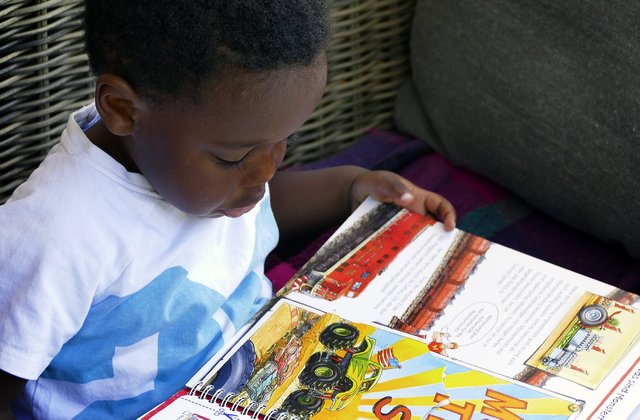Getting Children to Listen? Let Them Choose to Pay Attention

It’s no surprise: attention spans have taken a big hit. They are shorter today than ever before. Kids today do not listen to their parents, teachers, or elders as well as they did in previous generations. Websites and videos all over the Internet claim to provide secrets to helping parents get their kids to pay attention. It’s usually the predictable advice: integrating physical activity, removing distractions, breaking up larger assignments into smaller pieces, providing a diversity of different learning tools, and so forth.
Unless we believe that children have all the answers, then this shortened attention span does not bode well for humanity. Certainly, young people bring an energy and a fresh perspective that adults may lack. They have an intuitive understanding of technology and a responsiveness that suits the times. Old geezers and grannies do not have all the answers. And yet, one human lifetime is too short and our worlds are too complex for you to believe you can learn everything through your own firsthand experience.

The Demise of Attention Spans
Previous generations relied on the young having some deference to old age. Young people appreciated the wisdom of their parents and grandparents, knowing their lessons were learned through experience. This pattern continues in countries that remain fairly poor and undeveloped, where the benefits are clearer from these kids learning lessons they can apply soon enough. Some of them are put to work at an early age to clean, cook, weave baskets, or catch fish. But in so-called advanced countries, children are less interested in learning from their elders.
When you don’t internalize some of the lessons learned by others, it takes longer to understand human behavior. You are doomed to repeat past mistakes, miss patterns, and squander opportunities that the wisdom of your elders would have taught you to recognize. You may be sentenced to a meaningless life of playing video games in your basement on someone else’s dime.
Changing the Message, Not the Children
So if children won’t listen, then how exactly are we supposed to effectuate the transfer of knowledge that must take place from one human generation to the next?
The answer, according to some researchers who have been studying this problem (and reported in the by National Public Radio (NPR) in the link below), is fairly simple. But to address the issue, we first need to be clear that the kids are not the problem. Whatever the cause of their shorter attention spans (TV, computer games, dual income families, growing up in a complex world), the solution is not to try to “fix” these kids. Without changing the world around them, most approaches to “fixing” children are doomed to failure.

Instead, these researchers found that the message (or its delivery, if you want to think of it that way) can be fixed. When that message suits them, then children WILL listen to the content that an adult is trying to teach. And fixing the message does not mean dumbing it down or breaking up the content into bite-sized pieces. The grand solution, which these researchers proved to be effective, was to…
Give the Child Some Autonomy
Respect the child by giving him or her some freedom. Put that child in charge of making an important decision: deciding to listen. And when you give the kids a reason to listen, then they will (make that choice to) listen.

This is much like the children in indigenous societies. They are taught it’s important for them to help with chores, such as cleaning and cooking. In Mexico and Guatemala, there are indigenous Mayan families where children actually ask to help. They make the decision to help.
And researchers found that (U.S.) Americans can be similarly motivated. From young children to college students, people will pay better attention if they are given some incentive. And that incentive does not need to be money or candy. It can be as simple as: “If you finish the task sooner, you’ll get to go home sooner.”
It’s a form of autonomy. Rather than managing their time and their attention, we turn it over to them. We let them take control of their mind’s attention. And they make the decision what to do with it.
Three Steps to Motivating Kids
So how can parents motivate their children? The NPR article turns to cognitive psychologist Mike Esterman. First, he recommends asking your kid one question: “What would you do if you didn’t have to do anything else?” You must discover their passion, or at least the activity they most want to pursue right now. Second, you make time for their activity in their schedule. And third, you use that as a carrot, as an incentive, to motivate them to complete their homework or whatever task you need them to complete.

Researchers found that letting kids make the decision to focus on the task not only improved results. Their brains worked completely differently. There was more brain activity taking place on more pathways. They paid attention and they got their work done.
So each time I find myself TELLING my kids what I want them to do…instead I will begin by ASKING them what they want to do.

References (quotes are from last link below):
https://www.edutopia.org/discussion/7-ways-increase-students-attention-span
https://www.npr.org/sections/goatsandsoda/2018/06/09/616928895/how-to-get-your-kids-to-do-chores-without-resenting-it
https://letgrow.org/how-come-maya-children-are-twice-as-good-at-paying-attention-as-u-s-kids/
https://www.npr.org/sections/goatsandsoda/2018/06/21/621752789/a-lost-secret-how-to-get-kids-to-pay-attention
Images are public domain.
Being a school teacher, for me it is the most important thing to know the basic needs and psyche of my students. What actually they want and specifically in what way. It's been three years i am working in an education department and I found that you have to locate their interests, the way they want to listen. It conveys the things in a very perfect way.
These three wonderful steps are gonna help me to improve my teaching methodologies, how wonderful <3
Thanks lot for this amazing blog @donkeypong :)
I'm glad you appreciate it. The ideas are not mine originally; I'm merely explaining the research and advice as I understand it. We all work to be as good as we can for our kids!
There is no doubt every Parent/Teacher tries his/her level best to set the best examples for the kids :)
Oh yes, my friend, from the very childhood we learned to respect the opinion of our child, not imposing our own taste and decision, offered him a choice from the moment when he became able to do it. We tried, under certain restrictions, to grant him this freedom. We go to a kindergarten, and which way - he decides. What should he wear - within the limits of the weather, which on the street - he chooses himself from the proposed by us. Naturally, the child can make a choice only after he understands and evaluates each of the options. Our task was to find and offer both options that were initially attractive and safe for him.
And now he was learning to defend his opinion. He understood perfectly well that Papa and Mama possessed authority, strength, and perhaps even realized that they were right, but it was important for him to do as he saw fit. It does not matter if this option was a mistake or not, he wanted to make mistakes and decide for himself how it would be better for him. For him, it was important that adults understand that next to them is not a kid, but an equal in the level of a friend or friend. The child had to see himself in the new quality of an adult. Thank you @donkeypong
@donkeypong, That's very interesting and currently very important contents to me coz I was a father 2 weeks ago. Currently society ( parents) very busy with their working and very difficult to find free sometime both father and mother. Also haven't time for take care of their child. So lot of children going away for find their love. Finally can be child abuse. That's very dangerous situation. So listen and take sometime for telling them what's way they want to go on and how to be protect from current society. Every days stay with them very closely.
Yep..That's another greatest way to respect our child. They want to serious love and listen their likes and dislikes, daily tasks of them. So listening wanna more important for show our love to children. Thanks for shared valuable content Tom.
Thanks for your thoughtful comment.
Incredible. When we watch these senerio on TV, we begin to wonder if it's true. Oh yes in the western world it's true.
Here in Africa has its own way of getting children to listen to you. In old days, the pattern was terrible. I remember how I got disowned and slept outside the house because I told my dad I wanted to be dance entertainment . It did not stop until they realize I was so serious with that decision and it was making good wave for me. My parents began to realize that children of new age are to listened to, then guide their decision with advice and prayers.
So I was allowed to read theatre arts in the University which I am very happy with
That's a great story. Thanks for sharing.
There is a lot of great advice there. Especially "don't change the kids, change the message" that's so true (know your audience).
It sounds so simple and logical but it's something that could totally pass unnoticed.
Plus, why enter in a struggle (you trying to change the other person, the other person naturally resisting to change) while you could just change the delivery of the message.
Great post!
It becomes a battle of wills, which is unwinnable in the end. Some of that is unavoidable, since everyone is an individual, but listening and providing positive reinforcement seems a better way for some of it.
Hello how are you? This is a great topic, the children of before and the children of now are totally different. I always tell my teenage daughter that she is only 12 years old and she thinks that she is already 18 and I always talk to her about how things used to be and that everything changed, the world and technology away from our children, but it is up to us as parents to integrate into their world to know what they love, what they like, it is unfortunate that some parents prefer that their son spend all day stuck to a computer or a cell phone and they do not get their attention in the best way for them to share with them.
I really liked your post today and you give very good advice.
I send you greetings and a big hug from Venezuela
That's a very clear explanation. Well said!
Thank you very much!
This is my quest this very moment. My son doesn't pay attention when I'm talking to him. There are complaints from teachers saying "there's something about him " and seeing the teachers nail marks on his arm do my head in. Not being with my son for a long time change his behaviour and I know I'm responsible for it. Now I'm trying to keep him right and yes I will start it from his surroundings. I'm still having a hard time but hopefully, we can get back on track. I want him to be a good man when he gets old. All mothers wish I believe.
Thanks for this post. I really appreciated. The first post after my break, awesome!
You sound like a very good mother and you care deeply about your son. Use the time well, do some things he wants to do, and perhaps try to explain to him why you must be busy with other things some of the time. Best of luck to you.
♥
That’s true! However, as you mentioned in advanced countries with advance technology most parents are just not that well experienced. Usually children happen to educate their parents. Or parents can even be motivated by their children as you mentioned. Let the children have a bit of a freedom and what is very important for parents is to listen to their children. Find out what motivates them.
Great point about “how to raise today’s children!”.
All parents learn 'on the job' so none of us is perfect. :)
there is not a manual for parents each one does it in their own way how do you think is better
thanks this important lesson for parents today.
which you said above is true. the child's mindset has now grown. One example, they are very fast and astute in learning gadgets.
The young minds have the zeal whereas the old parents have the experience , the mix of the two is the best thing that can happen. Letting the kids to decide and supervising them gives a fruitful result and also, the kids learn the tricks to succeed. The calm approach of the parents to supervise the kids in their decision help the kids to understand the pros and cons and make them more attentive which builds them for a bright future. The best way to parenting is to let the kids perform and just keep your eyes on them to guide and supervise.....that what i feel..